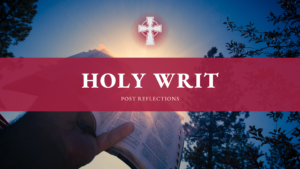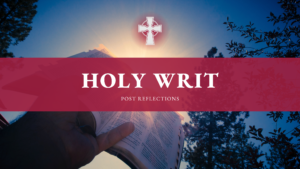
Seeking a healthy lifestyle is a goal that many of us strive for, but with so much conflicting information out there, it can be difficult to know where to begin. Fortunately, there are sources of wisdom and guidance that can help us on our journey toward health and wellness. Scripture and tradition, for example, offer insights and practices that can help us cultivate healthy habits and behaviors. Let’s explore some of these teachings, including the Litany of Work, the Spirit of Fasting, and the Diet Pattern from Garden to City. By learning from these timeless sources of wisdom, we can develop a healthier and Biblical approach to life and find greater peace and well-being in our daily lives.
The Litany of Work
When we engage in physical activity, we often focus on the benefits for our physical health and well-being. However, there is a deeper significance to our workout routines that can be found in the biblical narrative of creation, fall, and redemption. By examining the parallels between these themes and our exercise habits, we can gain a new perspective on the purpose of our bodies and the journey toward restoration and renewal.
- Day 7 Home at Rest (Eden, Plenty, Blessing, Rest, Morning)
- —-SIN—-
- Day 1-6 Leaving Home (Sojourners, Exiled, Cursed)
- Day 1-6 Running/Gym/Work (Egypt, Sweat, Thorns, Work, Thistles, Slavery, Trials, Tribulation, Midday)
- Day 1-6 Shower (Shower, Washing the old, baptism)
- Day 1-6 Dressing (Putting on the new, Imputation of righteousness)
- Day 8/1 Home at Rest (Restored body, Restoration, Freedom, New Creation, Evening)
As we reflect on working out, we can see parallels to the biblical narrative of creation, fall, and redemption. Just as God worked for six days to create the world and rested on the seventh day in Eden, we can use our bodies as microcosms to follow this pattern. On the seventh day, we rest at church and at home, just as Adam and Eve rested in the Garden of Eden.
Hard Sweat and Pain
However, because of our sin and falling short, we must first go through the journey of leaving paradise. Our bodies are like sojourners, exiled from the perfect state of Eden and cursed with the consequences of sin. Our toils are now infused with enduring sweat, thorns, and thistles; just as the Israelites suffered through slavery and tribulation in Egypt. But just as the Israelites were delivered from bondage, we too can find freedom and restoration for our bodies. Through silencing our inward selves and seeking to be perfect, we press on through the work week. Even after Egypt, because of sin, the Israelites struggled and toiled through sweat and tribulation.
Washing the Old, Putting on New
The journey towards restoration begins with washing away the old, just as we shower after a hard workout. This cleansing is close to baptism, in so far as we must go through the red sea to promise. As we dress in fresh clothes, we put on the new. May putting on new clothes after a long day or working out remind us of the imputation of Christ’s righteousness when he gives us the cloak of the new man.
“There and Back Again”
Finally, on the eighth day, we return home, our bodies restored and renewed. We can experience the freedom of a new creation, where we are no longer slaves to sin and death. We can embrace the evening of our lives with gratitude and joy, knowing that we have been transformed by the power of Christ.
May we remember that our bodies are fearfully and wonderfully made and that our work/workout routines can be a symbol of the journey toward redemption and restoration. Let us honor God with our bodies, and may our workouts be completed in light of this. After a workout, shower, and a change of clothes how at rest do you feel? Let’s remember we are both body and spirit and our work should be both spiritual and physical. Have a labor-intensive job? Challenge yourself to read a book once a week. Join a debate team. Have a desk job? Start a workout program, and challenge co-workers to join you. May we strive to work hard in all things.
The Two Ways: Labor or Lazy
James B Jordan makes a compelling case that bodily diseases in Scripture have usually a parallelism and connection to the land. For example, he will tie Job’s skin ailment to the land. As Scripture says:
“You shall not round off the hair on your temples or mar the edges of your beard.”
Leviticus 19:27
Additionally,
“And when you reap the harvest of your land, you shall not reap your field right up to its edge, nor shall you gather the gleanings after your harvest. You shall leave them for the poor and for the sojourner: I am the Lord your God.”
Leviticus 23:22
These passages emphasize the connection between the human body and the land, and the importance of respecting both through practices such as not trimming the corners of the beard and leaving the corners of fields unharvested for the benefit of the less fortunate.
The Way of the Sleepy Sluggard (De-creation)
“I passed by the field of a sluggard, by the vineyard of a man lacking sense, and behold, it was all overgrown with thorns; the ground was covered with nettles “
Proverbs 24:30-31
When we no longer work on our bodies, the thorns and thistles choke out our life source in the form of heart attack, seizures, stroke, diabetes, etc, etc. As our bodies are consumed by the curse, we follow a pattern of de-creation. Because our bodies are cursed, we have a harder time working, and because we have a harder time working, we continue to feed on and do things that curse us more (Proverbs 6:9, 19:15, 24:33, 26:14). It’s a perpetual loop of destruction (Proverbs 6:10, 12:24, 27:13:4, 19:15, 20:4). As the sluggard attempts to break the liturgy of de-creation, he will often make lame excuses and break back into the cycle (Proverbs 22:13, 26:13). As the cycle continues, he thinks himself the wisest of all his counselors (Proverbs 26:17).
The Way of the Wise Worker (Creation)
“Go to the ant, thou sluggard; Consider her ways, and be wise.”
Proverbs 6:6 KJV
The wise worker waits in the morning for God and is eternally vigilant (Ps. 4). She sweats now because she knows that she is being tried by fire and tested. There will be a day when our work is no longer consumed with thorns. Today is not that day. We must work out our salvation, we must sojourn in a foreign land. Because she works and knows her work is not in vain, she multiplies the kingdom of God and continues the ministry of reconciliation. She is the kingdom of God made manifest.
The Spirit of Fasting:
Checklists are highly discouraged in the New Testament our fasting should be more than that. The New Testament warns against turning spiritual practices like fasting into a checklist of to-dos and not dos. St. Paul writes,
“Since you died with Christ to the elemental spiritual forces of this world, why, as though you still belonged to the world, do you submit to its rules: ‘Do not handle! Do not taste! Do not touch!’? These rules, which have to do with things that are all destined to perish with use, are based on merely human commands and teachings. Such regulations indeed have an appearance of wisdom, with their self-imposed worship, their false humility, and their harsh treatment of the body, but they lack any value in restraining sensual indulgence.”
Colossians 2:20-23 KJV
Rules and Regulations
Paul is warning against following rules and regulations that lack spiritual value and only serve to restrict sensual indulgence. Fasting should not be reduced to a mere checklist of rules and regulations but should be done in the spirit of devotion and self-discipline. It is important that our fasting is incarnational. This means that fasting is both physical and spiritual without separating the two. We do not need to separate the act of fasting away from repentance and prayer because Scripture rarely ever does this. As St. Basil presents,
Do not restrict the benefit of fasting to abstinence from food alone. True fasting is abstinence from evil. Let go of every unjust tie. Do not sadden your brother. Forgive others their debts. Do not argue and fight when you fast. You do not eat meat, but you bite your brother. You stay away from wine, but you do not refrain from cursing others. You wait until evening to eat, but you spend your entire day dragging others through court.” And he adds: “Fasting is speaking in moderation; refraining from anger; separation from [evil] desires, criticism, lies, and oaths. Deprivation of these things is true fasting. Fasting is good when it is accompanied by these things.
St. Basil, “Sermon on Fasting,” in St. Basil the Great: On Social Justice, translated by C. Paul Schroeder (Crestwood, NY: St. Vladimir’s Seminary Press, 2009), 49-50.
The Why
“Moreover when ye fast, be not, as the hypocrites, of a sad countenance: for they disfigure their faces, that they may appear unto men to fast. Verily I say unto you, They have their reward. But thou, when thou fastest, anoint thine head, and wash thy face; That thou appear not unto men to fast, but unto thy Father which is in secret: and thy Father, which seeth in secret, shall reward thee openly.”
Matthew 6:16-18, KJV
The Sermon on the Mount and the Didache both warn against fasting in a way that draws attention to oneself only. The problem wasn’t that the Pharisees were fasting, it was why they were doing it. The focus should be on fasting as an act of devotion to God rather than a public performance.
Fasting as Charity and Devotion
Fasting can be a Godly way to increase acts of charity and devotion. For one, you are not worried about eating throughout the day. If you eat three meals a day that is three to four hours of time in the day used up. When you fast, you are now devoting that time to prayer, devotion, and to your neighbor. For another, it is cost-effective opening yourself to tithing more or giving to charity. Lastly, fasting provides practice and discipline of self-control.
Applying the Concepts of Fasting and Charity
To truly embrace the spirit of fasting and increase acts of charity, we need to put these concepts into action. Here are a few practical ways to apply these concepts in our daily lives:
Embrace a Simple Diet during Fasting Seasons:
Fasting doesn’t just mean abstaining from food, but also being mindful of what we eat. During Advent or Lent try abstaining from foods that are expensive and heavy. To make this more accessible, we can recommend simple recipes from websites such as Forks Over Knives and Engine 2 Diet that follow the WFPB or Daniel diets and practice bulk-preparing food. You can also practice St. Benedict’s Rule of eating twice a day instead of three times. St. Benedict’s Rule was formational in the work of the Book of Common Prayer, so some things are worth applying.
Volunteer at a Food Bank:
Food insecurity is a widespread issue, and volunteering at a local food bank can help alleviate this problem. In the Phoenix area, you can volunteer at the St. Mary’s Food Bank or the United Food Bank. By donating our time and resources to help those in need, we can embody the spirit of charity and make a positive impact on our community.
Serve at a Local Church:
Whether it’s leading a home group/Bible study or Friday night evangelism, many churches offer programs and services that help those in need. One such church in the Phoenix area is St. Andrew’s Anglican Church. By serving at a local church, we honor our neighbor and God.
Fasting: A Conclusion
These are just a few examples of how we can apply the concepts of fasting and charity in our daily lives. By acting and making a difference in the lives of our neighbors, we can walk with the Spirit in sincerity and truth. Let’s make a commitment to put these concepts into practice and be conformed by the renewing of our minds.
Diet Pattern: From Garden to City
In the beginning, God created a perfect world where everything was good, including the food that He provided for Adam and Eve to eat. But the discussion of food doesn’t end there. In fact, our whole narrative will end at a Marriage Supper in the New City. Our diets can retell the story of redemption. As St. Paul says,
“Whether therefore ye eat, or drink, or whatsoever ye do, do all to the glory of God.”
1 Corinthians 10:31 KJV
By examining the biblical account of the Garden of Eden, and other themes throughout Scripture we can learn valuable lessons about how to eat in a way that honors God and promotes our well-being.
Starting in the Garden
Adam and Eve started in the Garden and God told them,
“And God said, Behold, I have given you every herb bearing seed, which is upon the face of all the earth, and every tree, in the which is the fruit of a tree yielding seed; to you it shall be for meat.”
Genesis 1:29 KJV
This didn’t stop after their fall, rather, fruits or grains are continually tied to the animal sacrifices to God. As image bearers of God, we ought to look back to the antediluvian world, and clearly see how designed we were to digest the simplest foods like fruits and vegetables. The problem is, particularly in American Christianity, we do not eat like our forefathers. We don’t eat fruits and vegetables the way we out to. We need to eat those foods that we have crafted by a dominion with moderation and eat what God has given us directly with liberty and abundance. By eating in a way that is simpler and tied to the garden, we can cultivate a love for God’s provision.
Fasting in the Wilderness, Exile
After the fall of Adam and Eve, humanity was banished from the Garden of Eden and subjected to a world of hardship and struggle. In the wilderness, the Israelites faced hunger, thirst, and deprivation, but God provided for them in miraculous ways. Daniel refused the King’s meat in exile and maintained a simpler diet. The Didache states we ought to fast as a normal part of our diet pattern here:
“But let not your fasts be with the hypocrites, for they fast on the second and fifth day of the week. Rather, fast on the fourth day and the Preparation Day (Friday).”
Didache 8:1, in The Apostolic Fathers, ed. Michael W. Holmes (Grand Rapids: Baker Academic, 2007), 323.
Let’s gain insight into how to eat in times of scarcity and uncertainty by looking at the Biblical stories of fasting and the traditions that have been passed down to us.
Eating in the Heavenly City
In the book of Revelation, John offers a glimpse of the heavenly city, where there is no more hunger, thirst, or pain. Other images of a banquet at a wedding feast, a marriage supper, a fattened calf, and the list goes on when we dine with Christ in the New Covenant. Jew and Gentile come together at the table, and all foods are declared clean and available. As Christians, we need to celebrate with our food. We ought to have times of festivity where we enjoy food catholic. Because the celebration is not one of mere food. It must be stated that the feasting is an emphasis on the people and God. On Saturday night before Lord’s Day, families prepare the tastiest meals, prepare the greatest games, and sing with the harp and lyre. Send out invitations. Come, behold your King.
Diet: A Conclusion
In conclusion, Christians can honor God and reflect on the story of redemption through their dietary choices. Insights into how we should eat are provided from the Garden of Eden to the heavenly city in the Bible. By embracing a diet rooted in simplicity and gratitude for God’s provision, we can deepen our faith. Fasting in times of scarcity and uncertainty teaches reliance on God and emphasizes self-discipline. Ultimately, as we gather in communion with Christ and celebrate unity, our feasting proclaims the transformative work of the Messiah. Let’s embrace a diet pattern that glorifies God, promotes well-being, and fosters joy and gratitude for the abundant blessings we have received.
Related Articles and Sources:
Bush, Joshua. “Anglicanism and the Benedict Option.” Anglican Compass, May 7, 2019. Accessed June 20, 2023. https://anglicancompass.com/anglicanism-and-the-benedict-option/
Cruz, J. Bartolo. “A Reflection on Ember Days or Embertide.” Saint Andrew’s Reformed Episcopal Church Blog, Accessed June 20, 2023. https://saintandrewsrec.com/a-reflection-on-ember-days-or-embertide/
Didache 8:1, in The Apostolic Fathers, ed. Michael W. Holmes (Grand Rapids: Baker Academic, 2007), 323.
Esselstyn, Rip. The Engine 2 Seven-Day Rescue Diet: Eat Plants, Lose Weight, Save Your Health (New York: Grand Central Life & Style, 2016).
Pietro, Joseph. “Meditation on Fasting During Lent.” Saint Andrew’s Reformed Episcopal Church Blog, Accessed June 20, 2023. https://saintandrewsrec.com/meditation-on-fasting-during-lent/
St. Basil, “Homily on Fasting,” in St. Basil: Ascetical Works, trans. M. Monica Wagner, vol. 9, The Fathers of the Church (Washington, DC: The Catholic University of America Press, 1950), 51.
Wilson, Douglas. Confessions of a Food Catholic. Moscow, ID: Canon Press, 2017.
Our Mission
To multiply faithful servants of Christ; who will commit themselves to the worship and doctrines of the Anglican way, and who will work by God's grace and for His glory to disciple the nations through the ministry of the Church.









